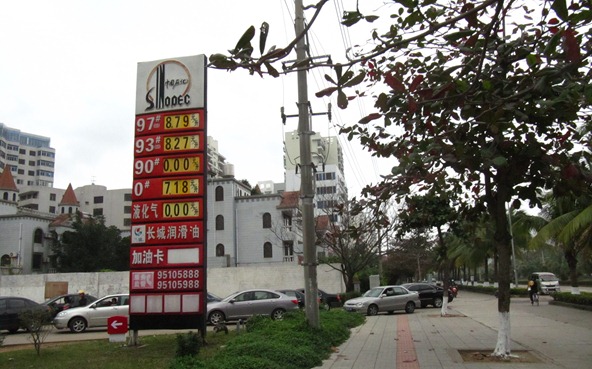
Cars lined up at a Haikou, China gas station – Photo by James Schwartz / The Urban Country (Jan 2012)
Want to get rich? Open up a gas station, a car wash, or an auto repair garage in China.
Car culture is sweeping through China as car ownership becomes affordable to countless new Chinese families. Car wash stations and auto repair shops are sprouting up all over the city I am living in – with demand still outpacing supply. Long line-ups are a regular occurrence at gas stations here.
The consensus among locals I speak to is that everyone wants to have a car. Owning a car validates that someone has reached a certain point of “success” in their life and once you reach that point where you can afford a car you never go back to riding scooters again.
The status works on a rising scale. The poorest of poor use pedal bicycles, which are becoming very uncommon here as people’s increasing wealth allows them to move up the chain to riding electric scooters.
Once someone reaches the next plateau of wealth, they ditch the electric scooters and graduate to car ownership. The wealthier you get, the more expensive your car is.
As the wealth here increases – and thus the number of automobiles increases – the Chinese will discover the ills and inconveniences of car ownership. They will reminisce about the days when they could actually get to their destination in a reasonable time on a bicycle or a scooter instead of sitting bumper-to-bumper not getting anywhere.
When they are sitting in a line-up for an hour just to fill their car with fuel they will miss plugging their scooter into the wall to re-charge it or hopping on their bicycle.
Yet they will find ways to rationalize sitting in traffic jams for two hours. They will tell you how comfortable their car is, how much they love listening to music in their car. They will find any reason to justify it – just like we have done since car culture swept through North America some forty plus years ago.
Below are a few photos I took of car-related business around the city while pedaling around on Saturday.
One of many car washing stations around the city – many of which didn’t exist a few years ago:

One-block-long line-up of cars waiting to get gas:
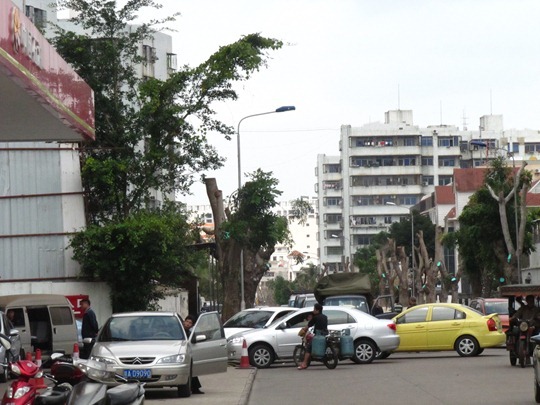
Some people got out of their car to get some fresh air while waiting for fuel:
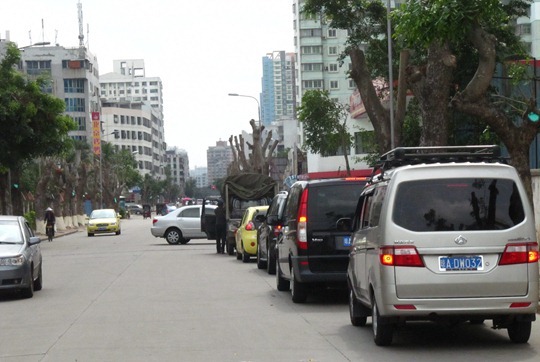
Another car wash station:
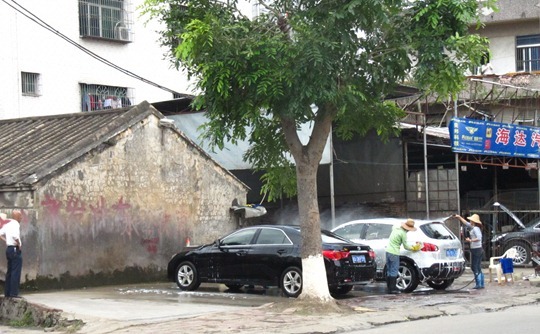
Porsche SUV and other cars being washed:

Even the natural-gas-powered taxi cabs weren’t exempt from line-ups. This natural gas station had taxi cabs waiting in line to fuel up:

Cars slowly making their way through this gas bar:
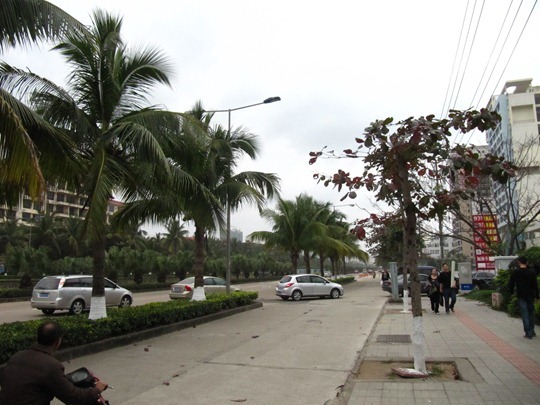
Haikou, China – All photos by James Schwartz / The Urban Country (Jan 2012)
Chinese families thankfully don’t drive anywhere near the distances that Canadians or Americans drive, so cars don’t need to be filled up too often.
People largely live urban lifestyles here – I have yet to see a detached single family house in all my travels through China – so long commutes to work from the suburbs are uncommon here.
But this influx of car culture could change all that. Will the Chinese culture of urban lifestyles outweigh the pressures of sprawl? Time will tell.
James D. Schwartz is a Transportation Pragmatist and the Editor of The Urban Country. You can contact James at james.schwartz@theurbancountry.com or follow him on Twitter.
Related Articles:
- Sunday Afternoon Traffic in China (Jan 2012)
- Democracy Is Good, But… (Jan 2012)
- The Chinese Car Obsession (Nov 2011)
- The Bicycle as a Status Symbol in China (Sept 2011)
- Only the poor ride bicycles in Shanghai (Sept 2010)


It may be too early yet, but are there any obvious indications that the car-owning middle class are fattening up?
Urban utility cycling has no affect on patterns of obesity. The distances are too small and the efficiency too great. If they begin to fatten up it will be because their affluence leads them to try living on exotic, foreign foods; Mountain Dew and Oreos.
How few miles per week do you think they are riding? 5 a day, 6 days per week, gives you 30/week, and 50/week was enough to change my weight and blood chemistry.
Utility cycling (in Denmark) has a measurable effect (well, correlation) on mortality and lifespan. Given that plenty-of-exercise is about the only medical advice I’ve ever received that has not later been qualified by a “no, wait…”, I’ll go out on a limb and call this one “cause”.
5 miles is one banana. A single pound of body fat is 35 bananas. Two Oreos and you’re getting fat while you ride. There are people who eat a half dozen Oreos for a five mile ride “for the needed energy.” You can have a bicycle be the most fuel efficient means of getting about, or you can have it be an effective way to use fuel in the reserve tank if you also maintain an appropriate diet to do so, but you can’t have both. The calculation requires only simple arithmetic.
Are you sure you didn’t start to get more exercise and eat better?
“Utility cycling (in Denmark) has a measurable effect . .. ”
On a goal post you just moved.
“well, correlation”
And correlation is not . . . ? If it were I could simply point you to a Dane or Dutch on a bike who could stand to lose a few . . . stone (they’re not really all that hard to find) and claim that cycling causes obesity.
“I’ll go out on a limb and call this one “cause”.”
Well, OK, utility cycling causes some people to get fat then. How would that affect the pattern of obesity?
I don’t think it’s such a simple calculation. Regardless of how few calories are burned, exercise improves your metabolism which helps burn energy more efficiently which helps one stay fit.
If you took two people, one who rides a bicycle for an hour each day, the other who never leaves the couch, I guarantee you that if both of these subjects eat the exact same diet, the one who rides a bicycle for an hour each day will be in better shape than the one who sits on the couch. Even if the cyclist eats an extra two Oreos 😉
” . . .exercise improves your metabolism which helps burn energy more efficiently . . .”
Emphasis added in order that what you said can be understood more easily. Do you know what “efficient” means? What you have not said is what “exercise” means, what “fit” means, or the mechanism through which the one leads to the other.
Hint: it is mostly through neuromuscular adaptation. i.e., learning how to perform the motion properly. Not a metabolic affect.
How did we go from urban utility cycling to 25 mile time trialing? The minimum energy need for moving a mass from one place to another is determined by the mass and distance. Time does not appear as a factor. Raising the energy need above the minimum is through inefficiency. Indeed, in a frictionless system you will move an infinite distance without any energy use at all.
The basic energy need of a cyclist is .015 Calories per gram per kilometer. If you reduce the mass, you reduce the energy need. Think about that.
How did we go from using a motor in the process of moving about the urban environment to never leaving a couch? How is the person on the couch prevented from exercising? What forces the person on the bicycle to exercise. How do accomplish the force feeding the couch potato and/or starving of the cyclist?
You are controlling diet, not exercise, just as bicycle racers must do in order to control their weight.
You need to think about these issues more; and more deeply.
And pay more attention to my premise, which in your closing statement you appear to have utterly abandoned.
The point I was making is that moderate exercise from urban cycling improves boost one’s metabolism which helps them burn more calories with less energy even when they aren’t exercising. The benefits of moderate exercise from cycling go beyond the simple calculation of the number of calories burned on any given trip…
I agree with you that diet is also very important. I was just trying to say that simply calculating the number of calories burned from point A to point B ignores the benefits of a boosted metabolism.
“moderate exercise from urban cycling improves boost one’s metabolism”
There is no “metabolic boost” from moderate, aerobic exercise. Metabolic boost is an effect of significantly depleting one’s glycogen stores which need to be replenished after the exercise is over, which only happens with more intense exercise. A racing effort. At low to moderate intensities you can ride until you fall asleep without inducing any metabolic boost if you maintain your normal diet.
To compound the issue, since one of the things that makes a bicycle efficient is that it is non weight bearing exercise, you will atrophy muscle in the process, reducing your energy needs at rest.
Muscle atrophy is how Mark Cavendish reduced his weight for racing this season. By staying out of the weight room and doing lots of moderate intensity miles.
I maintain, and even build a bit, of muscle by climbing mountains on a fixed gear at speeds that blow running backs off my wheel, but a few minutes of squats are far more productive; and produce a metabolic boost.
People with triple cranks neither can nor are they interested in such efforts. The middle aged man on a century ride bulging out of his lycra is a stereotype. You can certainly Google plenty of images of them, despite their 10k miles per year.
” . . . burn more calories with less energy . . .”
If you understood what a calorie is you could not have said this. It is an absurdity. Up your game in this supportive environment, lest you get smacked upside your ignorance outside of it.
“The benefits of moderate exercise . . .”
. . . are something I have not even sought to address in this thread, as they are not relevant to the inquiry.
Sorry, I meant burn more calories/energy with a lower heart rate.
I don’t know about how you ride, but my heart rate certainly increases on most urban cycling trips that I take. Whether I’m late for a meeting or climbing a hill, or going over a bridge, it’s very common for my heart rate to increase and wouldn’t this thus boost my metabolism?
I’m not really sure what you’re getting at. Obesity, we care about because it produces bad health and early death. The Danish study demonstrated that utility cycling reduced mortality (a lot) and extended lifespans. My experience (which has a before-after component to it) demonstrates that a moderate amount of utility cycling cuts weight and improves blood chemistry (and is also good for arthritis and mood). It has a much smaller N (1, versus 30,000+) but it does have a nice before/after component.
I did not make any effective effort to control my diet; one of the reasons I (re)started serious cycling was that I was having piss-poor luck through the diet-only route.
This is the Danish study: http://archinte.ama-assn.org/cgi/content/full/160/11/1621 . Lots of people, quite a few years, adjusting for other risk factors. You pointing out a few fat Danes on bikes would not be interesting information, compared to a study of this size and scope.
It-is-possible that this is all a miraculous coincidence, that in fact exercise has no particular effect on health at all. I wouldn’t bet on that, though.
I looked at your other reply. You’re trolling, and all your theorizing is bullshit. If you use a bike for utility cycling, chances are good it will make you healthier. There is some chance that you will lose weight. Despite cycling’s well-known efficiency, I did not eat enough extra food to cover the additional miles until I had moved my set-point about 20 pounds lower.
And no, I am not time-trialing. I am in a hurry when I ride, but who isn’t?
“I’m not really sure what you’re getting at.”
That because of its low energy needs URBAN utility cycling has no affect on patterns of OBESITY.
“My experience . . . ”
Is neither controlled nor a pattern.
You would be, in fact, better off walking, or driving to the velodrome to race train if you do not change your diet.
You could even be better off just staying home.
If cycling were not efficient we would drive to save fuel.
“You pointing out a few fat Danes on bikes would not be interesting information”
Then you do not understand it.
” . . .exercise has no particular effect on health . . .”
Neither you nor I addressed the issue of health until you moved the goal posts.
“You’re trolling, and all your theorizing is bullshit.”
This is bullshit.
Obesity is not that interesting, if it does not have an effect on health. The Danish study shows a big correlation. Cause is suggested by the large pattern across many studies all showing health benefits from exercise (including mouse studies, which help to rule out selection effects, i.e., healthy people choosing to get more exercise).
Your fixation on the efficiency of cycling, as transportation, does not negate the fact that it is also exercise. Compared to driving, many things are efficient. Because cycling in an urban environment is nearly as fast as driving (unlike walking), you can use it as a substitute without spending a lot of additional time on transit. It is also not *that* efficient — one rule of thumb is 50 kCal/mile, and 30 miles cycling per week means 1500 kCal per week.
As far as diet goes, for a few years around when I ramped up cycling, I did nothing particularly effective to change my diet, but I lost weight shortly after I started regularly riding my bike to work (15-20lbs). I did change my diet a few years later, and saw a modest weight loss (4lbs). The fact that I was able to make a change post-cycling that I was not able to make pre-cycling is perhaps interesting in itself, though obviously anecdotal.
By-the-way, you state “has no effect on patterns of obesity” with great confidence, almost as if you had read a paper describing this effect. Perhaps you could supply a reference? I did some searching, and found nothing that supports your claim of no-effect. I did find studies reporting that time spent in a car was correlated with obesity.
I did find: “For example, increasing physical activity levels by walking briskly for 1 to 1.5 miles a day (e.g., a 15- or 20-minute mile) could offset the estimated net daily caloric imbalance of 100 to 150 calories” (http://onlinepubs.trb.org/onlinepubs/sr/sr282.pdf)
Other articles discuss the effectiveness of small amounts of exercise (e.g., 30 minutes brisk walking, 5 times per week), if maintained over time. 5 miles per day is easily 150 calories, perhaps as much as 250. The lowest estimate I’ve seen for calories per mile is 30 — 10-12mph cycling by a 130lb person.
And yes, 150 calories is just one beer, or one can of soda, or two small bananas.
So what the heck is your point? Utility cycling looks exactly like what is recommended by experts as exercise for weight loss (along or combined with dieting), and it has the advantage that it “takes no time” in an urban environment, since you can substitute it for driving. And further, whopping large studies indicate that it really is good for you.
“Obesity is not that interesting, if it does not have an effect on health.”
Obesity is the issue you raised and the issue I addressed. Cyclists are often intensely interested in matters of only a few pounds of fat here or there for issues having nothing to do with health. For some it is of purely moral interest. For some others it is of positive interest.
You are not the standard of interest.
“. . . the efficiency of cycling, as transportation . . . ”
Is the subject.
“does not negate the fact that it is also exercise.”
The one is proportional to the other.
“Compared to driving, many things are efficient.”
Which leads me to strongly suspect you are ignorant of the efficiencies of driving. I have pursued them professionally. That’s one of the reasons I bicycle.
“almost as if you had read a paper describing this effect.”
I have read a good many, as well as a good many on mathematics, physics, engineering, biology and exercise physiology.
I have also cycled hundreds of thousands of miles. I understand the issues.
“Perhaps you could supply a reference?”
Your public library and The Internet, but they won’t do you any good if you don’t know how to use them first. The evidence suggests that you do not and I cannot teach it as a course through the medium of forum comments.
See if a local university offers the appropriate courses.
” . . easily 150 calories, perhaps as much as 250.”
I can easily modify your bicycle, at no expense, to require rather more. There is a physiological limit of about 1000 per hour. Few have the mental fitness to do that.
But unless there is some controlling factor on diet this is irrelevant.
“I did find studies reporting that time spent in a car was correlated with obesity.”
Correlation is not causation. I think you will find a stronger negative correlation with hand washing dishes.
“So what the heck is your point?”
The same as it was when you responded with a personal attack. It isn’t blowing in the wind, you can just read it again.
“looks exactly like what is recommended by experts as exercise for weight loss”
Suggesting a shallow familiarity with the literature, thus also probably what constitutes an expert.
” . . .large studies indicate that it really is good for you.”
What is your point?
ha, ha, you got no references, else you would provide them. Contrived trollish rules for blog comment debate do not change the fact that urban utility cycling provides enough exercise for weight loss. AND, irrelevant bonus, it is good for you.
You’re just bullshitting.
What is the force of gravity where I am standing?
I think we need a citation on that 5 miles per banana. That’s well outside all the estimates I see both for bicycle propulsion (least is 30 kCal/mi) and banana calories (most was 135 in an “extra large banana”). Because you know, if you’re going to be all pedantic, I really think you should do it right. I’d hate to think you were just pulling numbers out of your hat.
It may be too early yet, but are there any obvious indications that the car-owning middle class are fattening up?
This isn’t surprising, but it is somewhat depressing. Seems like gasoline ought to get really expensive once a decent fraction of Chinese are driving cars, or if a bunch of them switch to distant commutes.
Yes, I suspect gas will continue to go up. It’s already pretty expensive here (and the price is going up). The cost is currently approximately $5.20USD/gallon. Or about $1.38USD per litre. That converts to more than 30RMB per gallon which is quite substantial if you consider an average salary is roughly $666USD per month.
The people who own cars here obviously aren’t making an average salary. Car ownership here is still for the wealthy folks (and we still see traffic jams).
That’s actually about the same price as gas in Ontario. I notice the lowest grade of gasoline is 90 octane. Our highest grade of gas in Ontario is 91 (ignoring super 94).
90 octane is $1.35ish/L in China, and 91 octane is about the same here in Ontario.
Yes, it’s roughly the same as in Canada in terms of dollars-to-dollars. But when you consider the exchange rate it’s significantly more expensive here than in Canada – to the point where it’s unaffordable for an average Chinese person.
By comparison, a bottle of Coke here is $0.50 compared to about $2.50 in Canada. Monthly rent for a brand new 950 sq foot condo here is $250/month. A public transit ticket here is $0.16, compared to $3+ in Canada. A haircut/massage/shampoo here is $3.
The fact that everything else here is far less expensive, and salaries are much lower on average than in Canada, then this illustrates that gas here can only be afforded by wealthy people (which also explains why most people use electric scooters here whereas most people drive cars in Canada).
This isn’t surprising, but it is somewhat depressing. Seems like gasoline ought to get really expensive once a decent fraction of Chinese are driving cars, or if a bunch of them switch to distant commutes.
Urban utility cycling has no affect on patterns of obesity. The distances are too small and the efficiency too great. If they begin to fatten up it will be because their affluence leads them to try living on exotic, foreign foods; Mountain Dew and Oreos.
How few miles per week do you think they are riding? 5 a day, 6 days per week, gives you 30/week, and 50/week was enough to change my weight and blood chemistry.
Utility cycling (in Denmark) has a measurable effect (well, correlation) on mortality and lifespan. Given that plenty-of-exercise is about the only medical advice I’ve ever received that has not later been qualified by a “no, wait…”, I’ll go out on a limb and call this one “cause”.
5 miles is one banana. A single pound of body fat is 35 bananas. Two Oreos and you’re getting fat while you ride. There are people who eat a half dozen Oreos for a five mile ride “for the needed energy.” You can have a bicycle be the most fuel efficient means of getting about, or you can have it be an effective way to use fuel in the reserve tank if you also maintain an appropriate diet to do so, but you can’t have both. The calculation requires only simple arithmetic.
Are you sure you didn’t start to get more exercise and eat better?
“Utility cycling (in Denmark) has a measurable effect . .. “
On a goal post you just moved.
“well, correlation”
And correlation is not . . . ? If it were I could simply point you to a Dane or Dutch on a bike who could stand to lose a few . . . stone (they’re not really all that hard to find) and claim that cycling causes obesity.
“I’ll go out on a limb and call this one “cause”.”
Well, OK, utility cycling causes some people to get fat then. How would that affect the pattern of obesity?
I don’t think it’s such a simple calculation. Regardless of how few calories are burned, exercise improves your metabolism which helps burn energy more efficiently which helps one stay fit.
If you took two people, one who rides a bicycle for an hour each day, the other who never leaves the couch, I guarantee you that if both of these subjects eat the exact same diet, the one who rides a bicycle for an hour each day will be in better shape than the one who sits on the couch. Even if the cyclist eats an extra two Oreos 😉
That’s actually about the same price as gas in Ontario. I notice the lowest grade of gasoline is 90 octane. Our highest grade of gas in Ontario is 91 (ignoring super 94).
90 octane is $1.35ish/L in China, and 91 octane is about the same here in Ontario.
” . . .exercise improves your metabolism which helps burn energy more efficiently . . .”
Emphasis added in order that what you said can be understood more easily. Do you know what “efficient” means? What you have not said is what “exercise” means, what “fit” means, or the mechanism through which the one leads to the other.
Hint: it is mostly through neuromuscular adaptation. i.e., learning how to perform the motion properly. Not a metabolic affect.
How did we go from urban utility cycling to 25 mile time trialing? The minimum energy need for moving a mass from one place to another is determined by the mass and distance. Time does not appear as a factor. Raising the energy need above the minimum is through inefficiency. Indeed, in a frictionless system you will move an infinite distance without any energy use at all.
The basic energy need of a cyclist is .015 Calories per gram per kilometer. If you reduce the mass, you reduce the energy need. Think about that.
How did we go from using a motor in the process of moving about the urban environment to never leaving a couch? How is the person on the couch prevented from exercising? What forces the person on the bicycle to exercise. How do accomplish the force feeding the couch potato and/or starving of the cyclist?
You are controlling diet, not exercise, just as bicycle racers must do in order to control their weight.
You need to think about these issues more; and more deeply.
And pay more attention to my premise, which in your closing statement you appear to have utterly abandoned.
I’m not really sure what you’re getting at. Obesity, we care about because it produces bad health and early death. The Danish study demonstrated that utility cycling reduced mortality (a lot) and extended lifespans. My experience (which has a before-after component to it) demonstrates that a moderate amount of utility cycling cuts weight and improves blood chemistry (and is also good for arthritis and mood). It has a much smaller N (1, versus 30,000+) but it does have a nice before/after component.
I did not make any effective effort to control my diet; one of the reasons I (re)started serious cycling was that I was having piss-poor luck through the diet-only route.
This is the Danish study: http://archinte.ama-assn.org/cgi/content/full/160/11/1621 . Lots of people, quite a few years, adjusting for other risk factors. You pointing out a few fat Danes on bikes would not be interesting information, compared to a study of this size and scope.
It-is-possible that this is all a miraculous coincidence, that in fact exercise has no particular effect on health at all. I wouldn’t bet on that, though.
I looked at your other reply. You’re trolling, and all your theorizing is bullshit. If you use a bike for utility cycling, chances are good it will make you healthier. There is some chance that you will lose weight. Despite cycling’s well-known efficiency, I did not eat enough extra food to cover the additional miles until I had moved my set-point about 20 pounds lower.
And no, I am not time-trialing. I am in a hurry when I ride, but who isn’t?
“I’m not really sure what you’re getting at.”
That because of its low energy needs URBAN utility cycling has no affect on patterns of OBESITY.
“My experience . . . “
Is neither controlled nor a pattern.
You would be, in fact, better off walking, or driving to the velodrome to race train if you do not change your diet.
You could even be better off just staying home.
If cycling were not efficient we would drive to save fuel.
“You pointing out a few fat Danes on bikes would not be interesting information”
Then you do not understand it.
” . . .exercise has no particular effect on health . . .”
Neither you nor I addressed the issue of health until you moved the goal posts.
“You’re trolling, and all your theorizing is bullshit.”
This is bullshit.
The point I was making is that moderate exercise from urban cycling improves boost one’s metabolism which helps them burn more calories with less energy even when they aren’t exercising. The benefits of moderate exercise from cycling go beyond the simple calculation of the number of calories burned on any given trip…
I agree with you that diet is also very important. I was just trying to say that simply calculating the number of calories burned from point A to point B ignores the benefits of a boosted metabolism.
I think we need a citation on that 5 miles per banana. That’s well outside all the estimates I see both for bicycle propulsion (least is 30 kCal/mi) and banana calories (most was 135 in an “extra large banana”). Because you know, if you’re going to be all pedantic, I really think you should do it right. I’d hate to think you were just pulling numbers out of your hat.
ha, ha, you got no references, else you would provide them. Contrived trollish rules for blog comment debate do not change the fact that urban utility cycling provides enough exercise for weight loss. AND, irrelevant bonus, it is good for you.
You’re just bullshitting.
“moderate exercise from urban cycling improves boost one’s metabolism”
There is no “metabolic boost” from moderate, aerobic exercise. Metabolic boost is an effect of significantly depleting one’s glycogen stores which need to be replenished after the exercise is over, which only happens with more intense exercise. A racing effort. At low to moderate intensities you can ride until you fall asleep without inducing any metabolic boost if you maintain your normal diet.
To compound the issue, since one of the things that makes a bicycle efficient is that it is non weight bearing exercise, you will atrophy muscle in the process, reducing your energy needs at rest.
Muscle atrophy is how Mark Cavendish reduced his weight for racing this season. By staying out of the weight room and doing lots of moderate intensity miles.
I maintain, and even build a bit, of muscle by climbing mountains on a fixed gear at speeds that blow running backs off my wheel, but a few minutes of squats are far more productive; and produce a metabolic boost.
People with triple cranks neither can nor are they interested in such efforts. The middle aged man on a century ride bulging out of his lycra is a stereotype. You can certainly Google plenty of images of them, despite their 10k miles per year.
” . . . burn more calories with less energy . . .”
If you understood what a calorie is you could not have said this. It is an absurdity. Up your game in this supportive environment, lest you get smacked upside your ignorance outside of it.
“The benefits of moderate exercise . . .”
. . . are something I have not even sought to address in this thread, as they are not relevant to the inquiry.
Sorry, I meant burn more calories/energy with a lower heart rate.
I don’t know about how you ride, but my heart rate certainly increases on most urban cycling trips that I take. Whether I’m late for a meeting or climbing a hill, or going over a bridge, it’s very common for my heart rate to increase and wouldn’t this thus boost my metabolism?
Gas scooters come in many sizes and flavors. There is a perfect street legal scooter for everyone. From 50cc gas scooters that cost around $800 to 650cc Suzuki that cost over $7000 the choices are plentiful.
Gas scooters come in many sizes and flavors. There is a perfect street legal scooter for everyone. From 50cc gas scooters that cost around $800 to 650cc Suzuki that cost over $7000 the choices are plentiful.